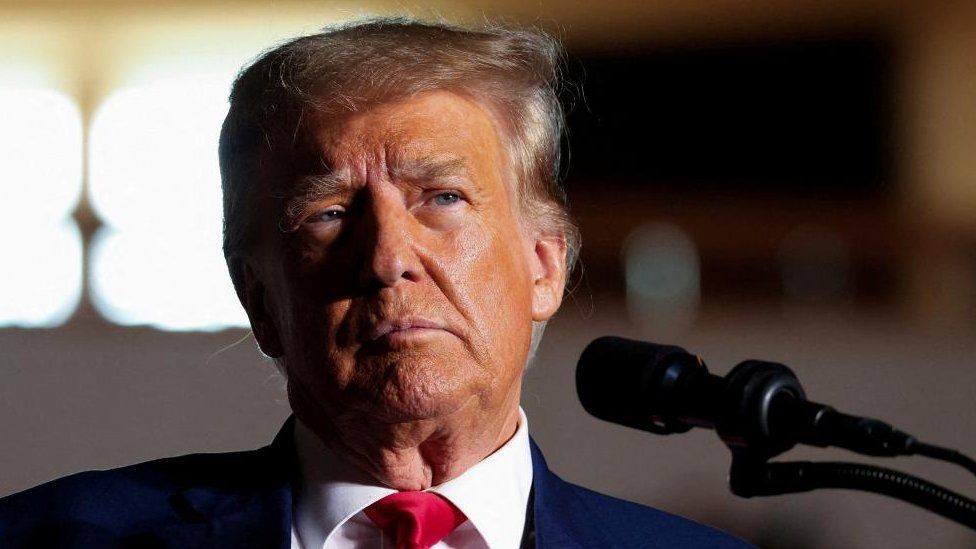We already knew that Donald Trump and 18 co-defendants have been charged with trying to overturn the 2020 election in Georgia – on Friday, we learned how close many more of the former president’s allies came to being prosecuted too.
A new report on the Georgia grand jury which investigated alleged election interference in the state outlines how that jury voted when asked to recommend criminal charges against a total of 39 people.
Those votes took place back in December 2022, but the details had remained sealed until now.
Here are three key takeaways from the report so far:
1. It was a close call for Lindsey Graham
The South Carolina senator, as well as former Georgia Senators David Perdue and Kelly Loeffler, may have narrowly avoided being indicted by Fulton County District Attorney Fani Willis.In one of the most noteworthy revelations in the court document, the grand jury voted to recommend indictments for the three senators. They had not been included when Ms Willis unveiled her sprawling racketeering charges against 19 individuals including Mr Trump in August.
- LIVE – latest updated, reaction and analysis
The recommendations to indict were close votes – narrowly over the minimum of 12 out of 21 jurors necessary for approval. That may have factored into a decision by the Atlanta district attorney not to move forward with charges against the senators. What is certain, however, is that an already highly politically charged case involving several former government officials could have come close to including a current senator and two Georgia politicians who still harbour aspirations for future office. Mr Graham said he was surprised by the jury’s recommendation, insisting that his intervention in Georgia had been consistent with his role as a senator and chairman of the senate judiciary committee.
2. There was a lone holdout against Trump indictment
Each time the Atlanta grand jury investigating the alleged conspiracy voted to decide whether to recommend indicting former President Donald Trump, one person said no.In votes on the legality of Mr Trump’s phone call pressuring Georgia Secretary of State Brad Raffensperger, on his contacts with other Georgia officials and on his national efforts to overturn the presidential election, there was always a lone holdout – and, in some instances, several abstentions.That made little difference in the outcome of the grand jury deliberations, where only 12 of the participating jurors needed to agree to approve an indictment recommendation. In a criminal trial, however, the jury will have to be unanimous to get a guilty verdict.
A holdout in that case could ultimately lead to a hung jury and a mistrial.Grand jury investigations and jury trials are very different proceedings, of course. But the fact that one juror had doubts even with the lower standard of making a “recommendation” to indict illustrates what a tough task it will be for Fani Willis – and all the other prosecutors who have brought charges against Mr Trump this year – to get a unanimous vote for a conviction.
3. Some ‘fake electors’ escaped charges
There’s an old cliche that the standard for getting a grand jury indictment is so low that prosecutors could successfully indict a ham sandwich. In Georgia, however, there were a handful of individuals whom the grand jury did not recommend indicting.While votes against former Mr Trump and his closest advisers were near unanimous, the grand jury was less interested in charging individuals – some of them private citizens – who agreed to list their names on documents that claimed that Mr Trump, not Joe Biden, won a plurality of the vote in Georgia.Three of these 16 “electors” who met in Atlanta on 14 December, 2020, and attested to a Trump victory were not named in the investigation and may have co-operated with the prosecution.Another, David Schafer – the chair of the state Republican Party and a former state senator – received an indictment recommendation and was one of the 19 charged last month.None of the others received more than 10 votes for an indictment recommendation on election charges, short of the 12 votes necessary. They did get recommendations for lesser charges of making false statements and filing false documents – charges Ms Willis chose not to pursue.The “fake elector” scheme – which included presenting documents to Congress to call into question the election results in several key states – is central to the prosecution’s case that Mr Trump and his allies were illegally trying to reverse the results of the presidential election. It is also a key component of special counsel Jack Smith’s indictment of Mr Trump on federal charges.

